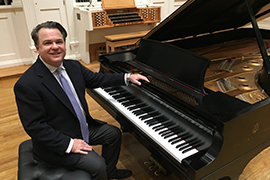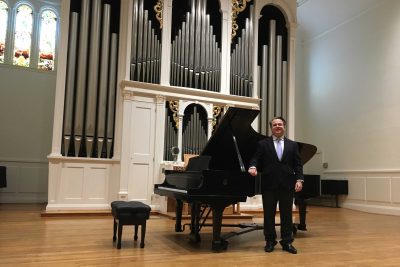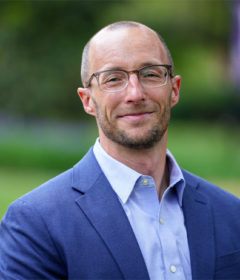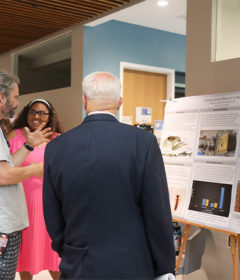5 Minutes with … Thomas Gilmore Masse

Tell us about your job at Stetson.

I have the great privilege of serving as Dean of one of the most important music schools in the country. I have oversight for the artistic and academic planning for the school, and work with a long-term faculty, who have been committed and dedicated to the school. Many of our faculty have been here over 30 years. They are an absolute delight to work with. The students come from all over Florida and all over the United States. It is quite simply a joy to work each and every day with this faculty, this staff and these students.
My job as Dean is a little bit different than some other deans in that the School of Music, by the nature of its curricular program, also serves as a presenter to the public. During the academic year, I spend a lot of time in Lee Chapel, attending concerts by faculty, by students, by student ensembles and by visiting guest artists.
I also have the opportunity to be surrounded by extremely high-quality music-making on a daily basis. I consider myself to have one of the best Dean of Music positions in the United States. This is a very special music school. It’s among the smallest music schools – about 260 majors and minors – and one of the few exclusively undergraduate institutions of music. It is a model that I think is ideal. It is a model that has served Stetson well for many years, and continues to train and provide the most rigorous and artistically fulfilling educational experience for an undergraduate student.
How long have you worked at Stetson and what attracted you here?
I’ve known of the excellence of Stetson in music for many, many years, as well as in baseball. I always equated music and baseball with Stetson. Throughout my career, I knew a good number of Stetson music alums, and I was always impressed by their artistic ability, their kindness, their thoughtfulness and their love for the institution.
When I was the Deputy Dean of the Yale School of Music, I saw about a dozen students come through Yale for graduate work and they had been undergraduates at Stetson. I used to ask them what was in the water in DeLand that was getting them to this graduate program where they had competed for admission with students from Juilliard School, Curtis Institute of Music, Eastman School of Music – all of the great music schools – and these Stetson students thrived and always had their heads screwed on straight. I knew these students. I had talked to them about their educational experience at DeLand and I often joked with friends and family that if the Dean’s position ever came open at Stetson, I would be very interested.
I was in the middle of my fourth year within the Provost’s Office at Yale and in some ways I had gone as far as I was going to go at Yale. It was a time when I wanted my own deanship and I opened the Chronicle of Higher Education and there was the position. I interviewed in December of 2012 and January of 2013, and I accepted the position in February 2013 and started on June 16, 2013.
When people ask why should they attend the Stetson School of Music, what do you say?

This institution is able to provide superb, conservatory-level musical training for its students because of a superb faculty, an ideal class size, individual attention from faculty that they would never find anywhere else as an undergraduate, and at the same time, a high level of rigor and a high level of advising and supervision. Even though we are incredibly rigorous, we need to make sure students have the assistance that they need to succeed here.
But one of the prime reasons why students succeed here is the individual attention by the faculty because of our small size (about 200 students majoring in music, 60 students minoring in music, 28 full-time faculty members and another 20 adjunct faculty members).
Where would you like to see the School of Music in five years?
I would like to see us continue to draw from a wider geographical pool for our students; to keep recruiting the best students possible; to provide scholarship assistance for these students to make a Stetson education affordable to anyone who wishes to study music here; to continue hiring the finest artist teachers and scholars for our faculty; and to enhance our international activities and presence.
I should mention that we also continue to improve our facilities. We have made significant renovations on our spaces in Presser Hall and this summer the school will be upgrading and refurbishing all of the student practice rooms on the third floor of Presser Hall, through a generous grant from the Presser Foundation.
Could you talk a little more about your plans to enhance the School of Music’s international presence?
We have had the opportunity to do a number of international events with our students. For example, two summers ago, we were able to send the Stetson Chamber Orchestra to Wales, England, to perform at a festival there with Music Professor Anthony Hose. That same summer, we were able to send 12 voice students to Germany and London, through the Apgar Foundation, to study the sacred works of Bach and Handel.
We hope to expand our presence internationally through the new hires that we’ve made recently. I am delighted to announce that internationally renowned pianist Sean Kennard is joining the faculty and will replace Dr. Michael Rickman, who retired this month. We will be introducing Sean soon to the Stetson faculty, students and staff. (Kennard received a Bachelor of Music from the Curtis Institute of Music and a Master of Music from the Juilliard School. He has won top prizes at piano competitions around the world and has performed with orchestras from Japan to Italy to Chile, according to his website.)
With Sean’s international reputation, particularly in Asia, we will have an opportunity to recruit students from that part of the world more effectively and in greater numbers, and to position our school artistically in parts of the world where we have great opportunities.
What do you enjoy doing in your free time?
I enjoy travel. I enjoy exploring Florida. I spend time with my dog, a West Highland White Terrier, named Stella — she’s kind of the School of Music mascot — and I attend a lot of cultural events.
Bio
Education: Artist Diploma as a clarinetist, Yale University; Master of Music, Yale University; M.B.A., University of Connecticut; and Doctor of Musical Arts, University of Michigan.
Hometown: Guilford, Connecticut
Family: Married to James Perlotto, M.D.



